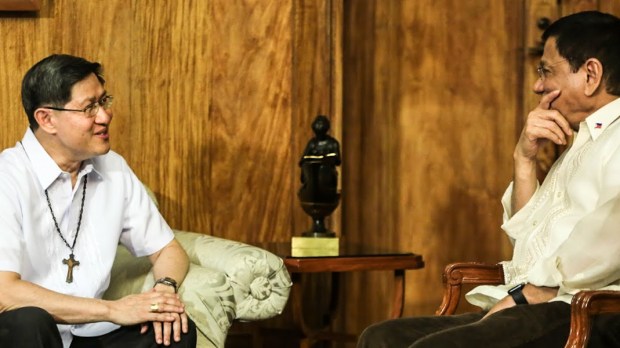Since Rodrigo Duterte came to power in May of 2016, more than 7,000 Filipino citizens allegedly involved in drugs have been killed. None was offered rehabilitation or fair trial. Many have been minors and children. The most recent victims were 2 young men shot by police. This wave of killings under Duterte’s watch has angered pundits, policymakers, academics, and Catholic schools. And rightly so.
Yet, there has been one public voice that has seemed to keep silence: Cardinal Luis Tagle’s. Unusual, given the moral influence he holds as archbishop of Manila and the respect the president has for him.
Upon closer inspection, however, one will realize that the cardinal has been making a stand. Ever since Duterte was elected to office, Cardinal Tagle has denounced violence and killing in any form, but always without hitting the president. Instead, he has emphasized the need for unity rather than division, redemptive action rather than criticism.
Here is a chronicle of all his major statements on extrajudicial killings, from August 2016 to his two recent ones this month. Each one shows his moral courage, but also his belief that everyone deserves a chance at redemption, whether citizen or president, policeman or drug suspect:
August 29, 2016 – On Catholic radio he tells listeners to be wary not only of extrajudicial killings, but all forms of killing.
October 23, 2016 – His diocese launches a parish-based drug rehabilitation program, showing that effective alternatives are a more powerful argument than words.
December 11, 2016 – Delivers a homily about how we must give sinners aid and not death.
January 8, 2017 – He celebrates Mass for reformed drug addicts. Each one is a living sign of his message the month before.
August 20, 2017 – After a lull of eight months, he releases a pastoral statement expressing his views on the killings. This statement was in response to the killing of Kian de los Santos, a 19-year-old boy whom police suspected of selling drugs.
In this statement, instead of discussing his position in the political debate, Cardinal Tagle opens with a call to unity. In his first paragraph, he reminds Filipinos that, regardless of faction, we all want what is best for our people. All Filipinos want to rid the country of illegal drugs and theit dehumanizing effects:
First, all Filipinos agree that the menace of illegal drugs is real and destructive. We must face and act upon together, as one people. Unfortunately, it has divided us. Given the complexity of the issues, no single individual, group, or institution could claim to have the only right response. We need one other. We cannot disregard each other.
After this conciliatory reminder, Cardinal Tagle offers one concrete way he, as bishop, can address the increasing violence. He stresses that this problem is not just political or criminal, but human.
Let us invite families, national government agencies, local government units, people’s organizations, schools, faith-based communities, the medical profession, the police and military, recovering addicts etc. to come together, listen to each other, and chart a common path.The illegal drug problem should not be reduced to a political or criminal issue. It is a humanitarian concern that affects all of us. The Archdiocese of Manila would be willing to host such multi-sectoral dialogue.
His statement exemplifies how the Church does not only preach, but works to protect humanity.
September 8, 2017 – 19 days after his previous statement, he releases a second one, which one journalist called “his strongest written statement against drug war killings.”
In it, Tagle reports that he hosted a multi-sectoral dialogue five days after his last statement. He also mentions how he spent time with victims’ families and preached a half-day retreat at the Philippine National Police Academy.
These practical initiatives, which reach out to people on both sides of the issue, underline his strong belief that the more effective solution to this whirlpool of death builds unity rather than division.
His preference for unity, however, does not mean he brushes the problem under the rug. As the following excerpt shows, the increasing number of deaths troubles him deeply. But instead of putting blame on particular government agencies or individuals, he prefers to see the responsibility of governance as the responsibility of all Filipinos:
With pain and horror we continue to get daily news of killings around the country.We cannot allow the destruction of lives to become normal.We cannot govern the nation by killing.We cannot foster a humane and decent Filipino culture by killing.As we denounce as inhuman and un-Christian an act willfully intended and planned to inflict harm or death on a human person, we call on those who harm or kill others to listen to their conscience, the voice of God that summons us to do good and avoid evil.Heartless violence can be conquered only by a change of heart and by discovering in the depths of our being the inclination to do good and to love our neighbor.
He closes the letter with a reminder that overcoming violence can only happen when those responsible for the killing experience a conversion of heart, and rediscover their inner desire to do what is right. This reminder urges Filipinos to see that the problem’s cause is neither political nor limited to a few corrupt politicians. The root cause is a wound we all share as human beings–a wound that only grace can heal and change.

